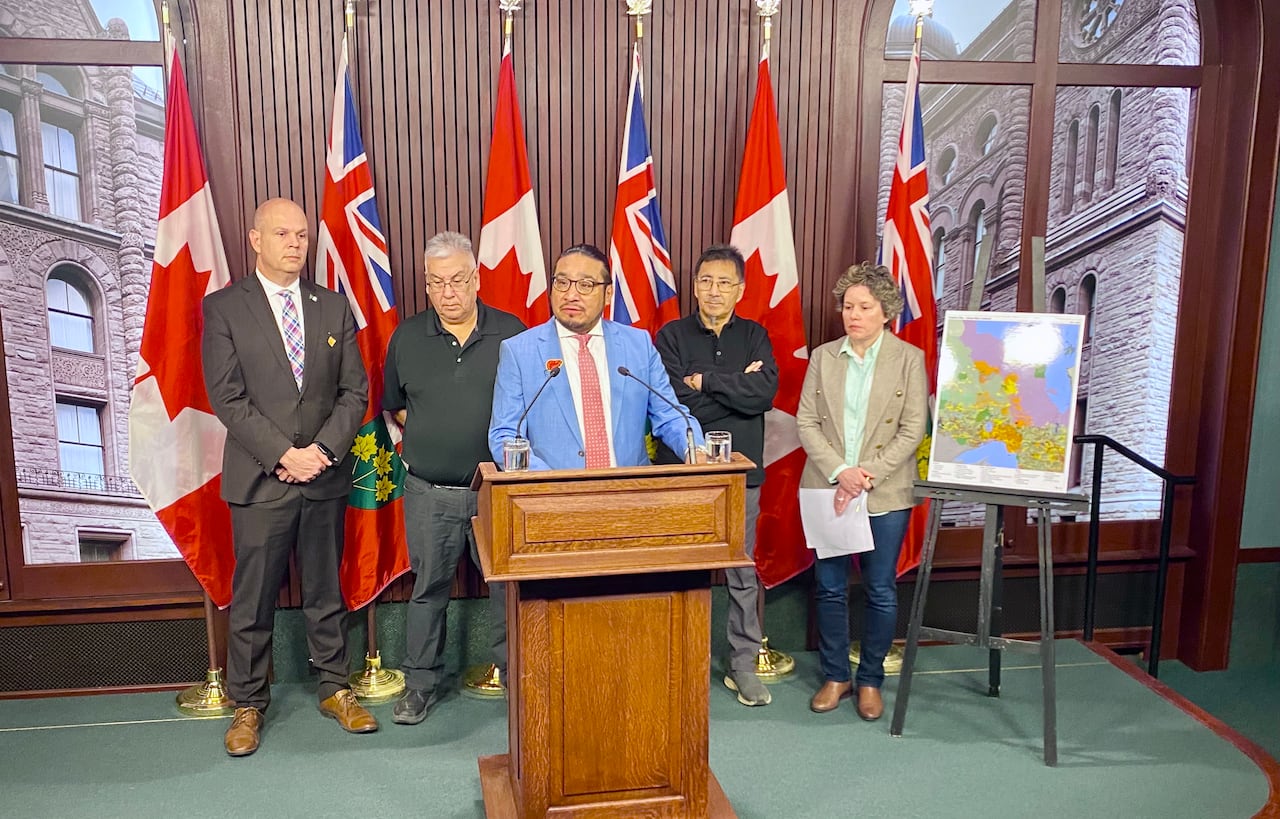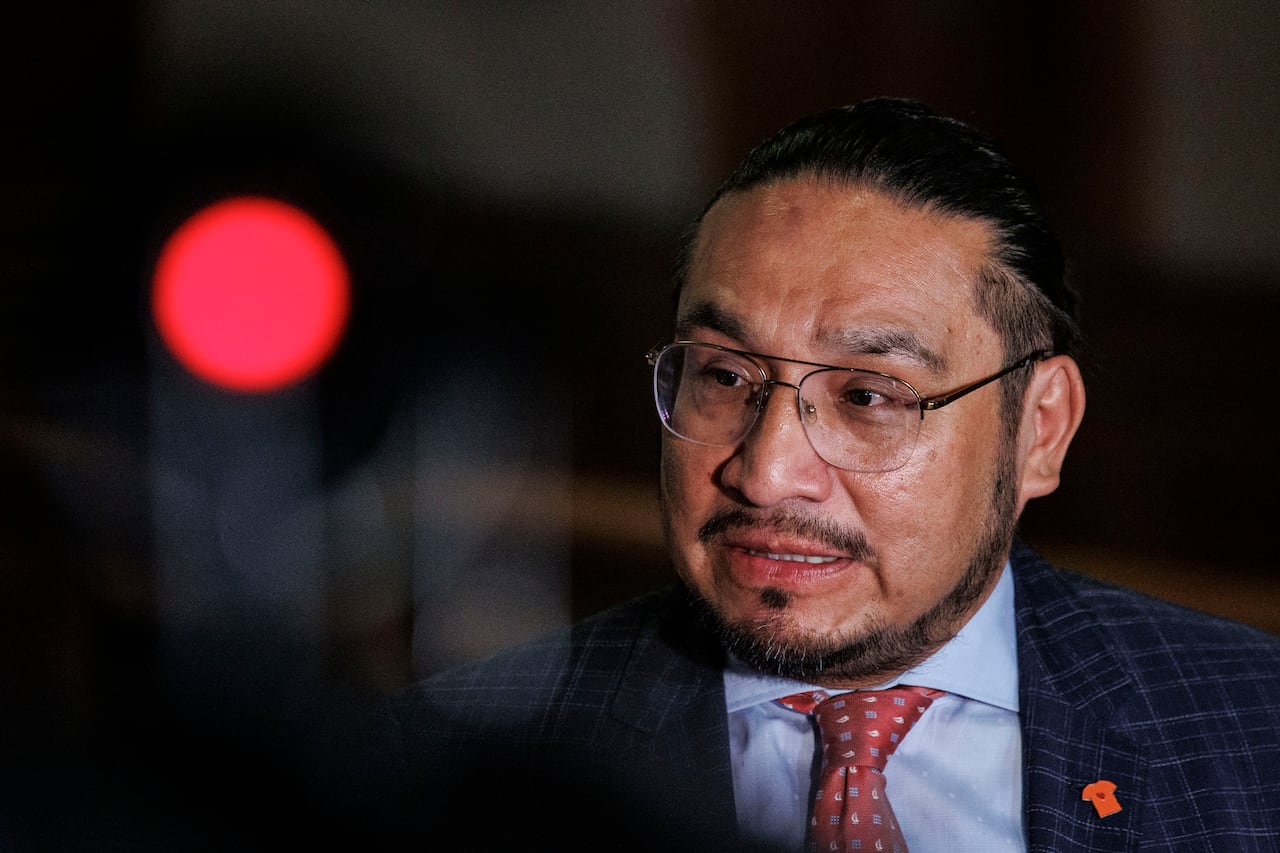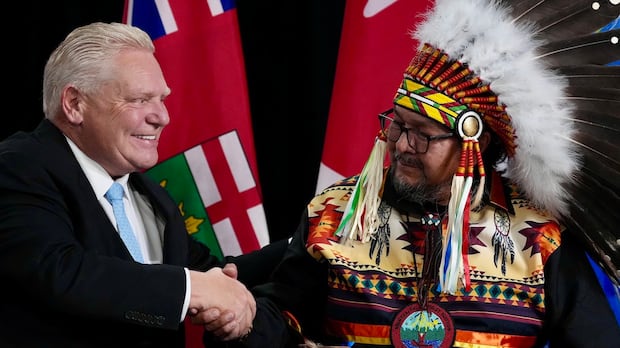Listen to this article
Estimated 6 minutes
The audio version of this article is generated by text-to-speech, a technology based on artificial intelligence.
As part of its ongoing plans to develop in the mineral-rich Ring of Fire region, the Ontario government has signed a community partnership agreement with Marten Falls First Nation.
The agreement comes with up to $39.5 million, matching the amount promised to Webequie First Nation through an agreement it signed with the province last month. The province also signed a shared prosperity agreement with Aroland First Nation in January.
Premier Doug Ford says unlocking critical minerals in the Ring of Fire — a crescent-shaped mineral deposit in the James Bay lowlands in northwestern Ontario — “will add $22 billion to Canada’s economy and create 70,000 new jobs.”
However, the province needs to build roads in order to reach that deposit — which would go through First Nations’ traditional territories. These projects include:
“Right now, Marten Falls First Nation relies on air transportation that is extremely expensive to fly in and out, and many of our community members cannot get to appointments on small planes,” said Marten Falls First Nation’s Chief Bruce Achneepineskum during Thursday’s news conference at Queen’s Park.
“They’re actually looking forward to the winter road season when they can drive out at their own leisure — but it shouldn’t be like that. [They] should be driving out at any time.”
 Ontario’s Premier Doug Ford is seen standing in front of a map depicting the Ring of Fire region and proposed roads leading up to the mineral deposit, located in the James Bay lowlands. (Evan Mitsui/CBC)
Ontario’s Premier Doug Ford is seen standing in front of a map depicting the Ring of Fire region and proposed roads leading up to the mineral deposit, located in the James Bay lowlands. (Evan Mitsui/CBC)
While Ford touted the project’s importance in unleashing “the enormous economic potential of the Ring Fire,” he also spoke of the benefits this would bring to the First Nation.
“We want to change their lives,” Ford said. “This is all about making their children and their grandchildren have a brighter future.”
Fewer than 400 people live in Marten Falls, a remote Anishinaabe community about 400 kilometres northeast of Thunder Bay. This year marks the 20th anniversary of its ongoing boil water advisory, which was put in place in July 2005.
Marten Falls is among dozens of remote First Nations in the region that rely on seasonal winter roads, also known as ice roads, to transport essential supplies to the community at a much lower cost than bringing them in by plane.
The $39.5 million is contingent on Marten Falls submitting its environmental assessment for the community access road to the province by Feb. 20, 2026. However, the project is also subject to a federal approval process.
“Pending approvals and consultations, construction will begin as soon as August 2026, subject to the federal government ending its duplicative impact assessments in the region,” says Thursday’s news release from the Ontario government.
‘Divide-and-conquer approach’
Meanwhile, many First Nation leaders in the region have expressed opposition to the province’s development plans in the Ring of Fire — citing concerns about lack of consultations with the government and the implications of recent legislation which aims to fast-track projects, such as Bill 5 and the One Project, One Process (1P1P) Framework.
“Where you pay First Nations to access their homelands, their territories — where you give them something … for you to take something — governments have been doing that for hundreds of years,” Kiiwetinoong NDP MPP Sol Mamakwa said during a news conference last month in response to the 1P1P approach.
 Kiiwetinoong NDP MPP Sol Mamakwa is seen speaking at a podium during a press conference at Queen’s Park on Thursday. Mamakwa says it’s important for the province to engage in meaningful dialogue with First Nations about development and land protection. (Submitted by Bridget Carter-Whitney)
Kiiwetinoong NDP MPP Sol Mamakwa is seen speaking at a podium during a press conference at Queen’s Park on Thursday. Mamakwa says it’s important for the province to engage in meaningful dialogue with First Nations about development and land protection. (Submitted by Bridget Carter-Whitney)
By signing funding agreements with some First Nations and not others, Mamakwa said the government is fracturing relationships among communities to achieve its development goals with less opposition.
“The divide-and-conquer approach is continuing to this day,” Mamakwa said.
When asked about his consultations with First Nations that oppose the road projects, Ford said “I want all communities involved; even if it doesn’t impact them, I want them all part of it. I want to change their lives.”
Where you pay First Nations to access their homelands, their territories — where you give them something … for you to take something — governments have been doing that for hundreds of years.- Kiiwetinoong NDP MPP Sol Mamakwa
An hour before Ford’s news conference with Marten Falls, Mamakwa held his own media event with leaders from Kitchenuhmaykoosib Inninuwug (KI) and Wapekeka First Nation as well as the Wildlands League, a not-for-profit environmental conservation organization.
About 20 years ago, KI and Wapekeka passed their own laws to declare three million hectares of their homelands as permanently protected from development — or “withdrawn” from mining claims.
These lands, called Anishininew Aki, include the KI land withdrawal area and the Fawn River Indigenous Protected Area, which cover an area 48 times larger than the city of Toronto.
Now, the First Nations are “asking Ontario to reciprocate and do work under Ontario’s laws to fully and permanently protect [these lands],” said Anna Baggio, conservation director for Wildlands League.
“We need Ontario to be there so that in the future, these [withdrawal] lands are secured — secured in a way where there’s no disturbances until we feel ourselves in that region that we’re ready for whatever [development] opportunities there are in the future,” said KI’s Chief Donny Morris.
Morris expressed concerns about roads to the Ring of Fire putting caribou populations at risk, which his community relies on as a primary food source.
 Mamakwa, seen in this June 2025 file photo in Toronto, says governments have a history of signing agreements with First Nations when they want something from their lands, which puts communities at risk of exploitation. (Evan Mitsui/CBC)
Mamakwa, seen in this June 2025 file photo in Toronto, says governments have a history of signing agreements with First Nations when they want something from their lands, which puts communities at risk of exploitation. (Evan Mitsui/CBC)
However, he said he supports Marten Falls and Webequie in choosing what is best for their people. “They can decide if it’s going to benefit their communities in the long run,” he said.
As for Mamakwa, he reaffirmed the importance of the province fulfilling its duty to consult First Nations and respect their free, prior and informed consent.
“When a First Nation comes here, when the leadership comes here, you know that they want to have a dialogue, they want to work with this government,” Mamakwa said. “I think it’s an opportunity to be able to do it in a very diplomatic way.
“The leadership of KI has shown Ontario they know what lengths they are willing to go to protect their homelands — but also to protect their sovereignty.”

